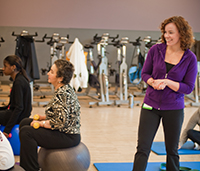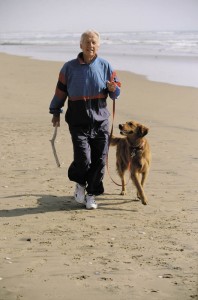Cancer-related fatigue is one of the most common complaints among cancer patients and survivors. This type of weariness, which typically occurs during treatment or in the first year after, is particularly difficult because it can last for long periods of time and doesn’t go away after sleep or rest.
A growing body of research shows that cancer patients who get regular exercise report feeling less tired.
If you’re interested in starting an exercise routine to address fatigue, consider these tips:
 Choose an exercise you enjoy. You’re more likely to stay active if you enjoy what you’re doing. Many cancer patients choose walking as their preferred exercise, but other examples include bicycling, swimming, or running. You may also benefit from mind and body exercises, such as Qigong, tai chi, and yoga – all of which are available through Dana-Farber’s Zakim Center
Choose an exercise you enjoy. You’re more likely to stay active if you enjoy what you’re doing. Many cancer patients choose walking as their preferred exercise, but other examples include bicycling, swimming, or running. You may also benefit from mind and body exercises, such as Qigong, tai chi, and yoga – all of which are available through Dana-Farber’s Zakim Center
- Check with your doctor. Before you begin, make sure that your exercise plan won’t interfere with your treatment or recovery. Ask your doctor about any precautions you should take and whether there are activities you should avoid.
- Start at a pace that matches your fitness level. Ideally, you’ll want to get at least 3 to 5 hours of moderate activity every week to help reduce your fatigue. But don’t try to increase your activity level by more than 10 percent a week. So, for example, if you normally go for a 10-minute walk every day, don’t jump up to 30 minutes. Focus on incremental goals. Start with light activity for short periods of time and build up until you’ve reached a point where you’re getting at least 5 hours of activity.
- Don’t overdo it. If you find that fatigue is becoming worse when you exercise, you’re probably going too hard. Other warning signs to watch for when you’re exercising include: extreme shortness of breath, an unusually fast heart rate, or dizziness. Listen to your body. If it doesn’t feel right, you should dial back the intensity of your workout.

Remember, a little bit of something is better than nothing. When I lead a women’s exercise class or meet with a patient for a free exercise consult, I like to remind participants that even small steps can help. Physical activity offers a range of benefits for cancer patients. It can help lower stress, strengthen muscle mass, elevate mood, improve sleep patterns, and more.
If you’re not feeling well enough to exercise, even stepping out the door to take a short walk around the block can be helpful. Or you may want to start a stretching program to regain your range of motion. The key is to stay active, even a little bit, to maintain your mobility and flexibility.
Visit Dana-Farber’s Slideshare page for a presentation on these exercise tips.


As a cancer survivor now in remission and frequent participant in Nancy Cambell’s class, I can’t agree more with all of the comments already posted on this blog site. One cannot possibly sufficiently extol the benefits of this DFCI-sponsored exercise program and class that Nancy leads. At least for most of us, it would be all but impossible to start a regular exercise program at a gym/one just does not have the strength/stamina to do so. Nancy’s understanding of the physical (and emotional) needs of ‘her students’ plays a crucial role in helping each individual get back on the road to feeling healthy and ‘normal’ again. The class is geared to building strength and flexibility and encompasses a range of exercises from gentle cardio, to strength training, to yoga and even pilates. Everyone is encouraged to participate at a level that works for them/there is no pressure/the environment is one of support. Upon leaving each session I never fail to feel invigorated, clearer of mind, and physically stronger.
You can increase the efficacy of gentle exercise by combining it with breath work, such as Qigong. Qigong has been used with much success to help people with cancer, and is quite common in China. But, most importantly, you need to enjoy it, whatever it is that you choose to do.
Great article. I was fortunate recently to have been a participant in a clinical trial looking at the effects of exercise and insulin levels on reoccurance. I worked with Nancy Campbell to increase my exercise gradually reaching 225 minutes per week (5 45 min sessions per week). I felt more energtic, lost weight and inches. Nancy was very knowledgable and a pleasure to be with during our workout sessions!
Do you have addresses of places in the Taunton area that would resemble Nancy’s classes. We travel to Boston to treatments as it is quite often, so it isn’t an option for me. Thanks.Paul C.
Hi Paul, to my knowledge, the YMCAs in Taunton and East Bridgewater offer the Livestrong program, which is specially designed for cancer survivors. Try this link, or call the YMCA directly 508-823-3320. http://oldcolonyymca.org/main-healthy-living/health-well-being-fitness/healthy-lifestyles/livestrong-ymca